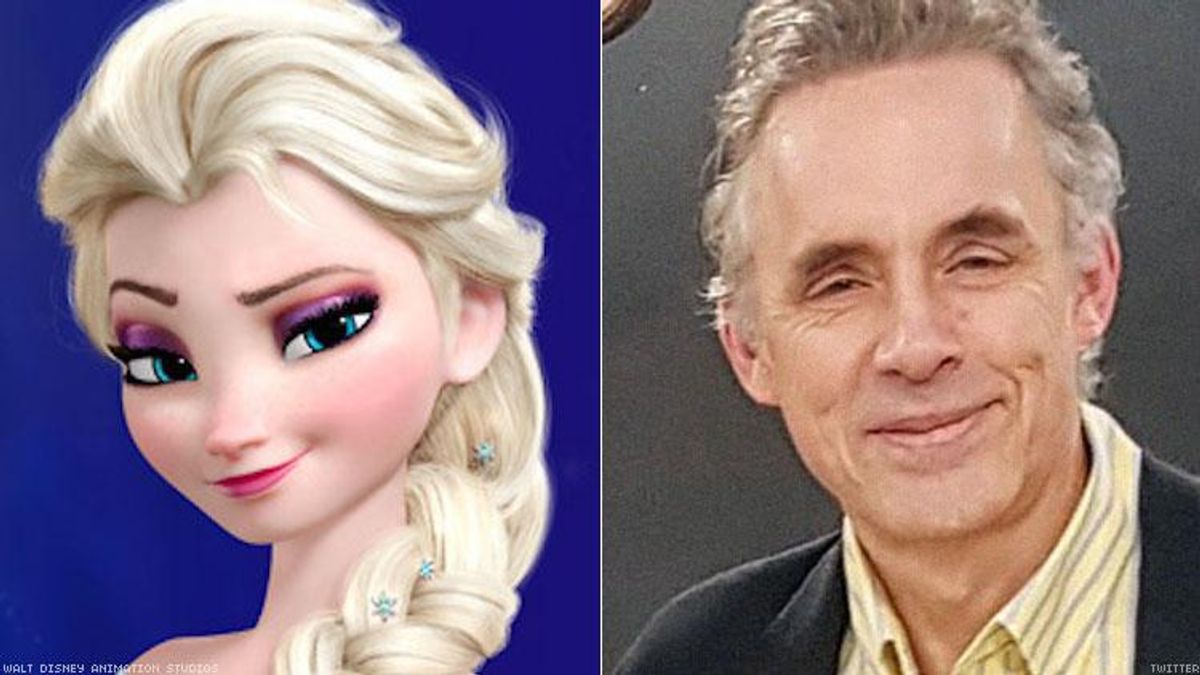Cultural critic, clinical psychologist, and University of Toronto psych professor Jordan Peterson is known for his controversial views. The author of a new book, 12 Rules for Life: An Antidote to Chaos, Peterson set off a firestorm in 2016 with his blatant blowback about the increasing demand for the use of gender-neutral pronouns on campus.
"There's no way I'm going to use words made up by people who are doing that -- not a chance," Peterson said in 2016 when referring to the call to use the pronouns of a person's choice as "authoritarianism" at the hands of "social justice warrior, left-wing radical political activists."
Now the button-pusher has taken on a modern classic -- the beloved animated Disney film Frozen, calling it "deeply propagandistic" in his new book. In an interview with Time, he explained his chilly reception to Frozen (in which sisterly love between Queen Elsa and Princess Anna essentially saves the day), the reasons for which appear couched in the fairy tale's refusal to place a heterosexual relationship at the core of its narrative.
"It [Frozen] attempted to write a modern fable that was a counter-narrative to a classic story like, let's say, Sleeping Beauty -- but with no understanding whatsoever of the underlying archetypal dynamics," Peterson told Time. "You could say that Sleeping Beauty was raised out of her unconsciousness via a delivering male."
Peterson then unsurprisingly latched on to Freudian theory to explain his hatred of the 2013 blockbuster. "Another way of reading the story is that unconsciousness requires active consciousness as an antidote," he said. "And the unconsciousness is symbolized in that particular story by femininity and active consciousness by masculinity. There was an attempt to craft a moral message and to build the story around that, instead of building the story and letting the moral message emerge. It was the subjugation of art to propaganda, in my estimation."
Peterson, who wrote about fairy tales, myth, and religion in his book Maps of Meaning: The Architecture of Belief, is certainly well-versed in the subject of archetypes and fairy tales, but his refusal to acknowledge the changing world around him on a university campus where he refused to respect his students by using their preferred pronouns is indicative of a refusal to accept that fairy tales and myths may shift with the culture.
When Time interviewer Belinda Luscomb pressed him to justify his stance and asked if Frozen were more "propagandistic" than The Little Mermaid, he was implacable.
"Those other movies are based on folktales that are maybe -- some of those folktales have been traced back 13,000 years," Peterson said.
Then Luscombe asked if no new stories were allowed to be created, and he replied, "Not for political reasons."
After pressing him a few different ways, Luscombe got to the crux of Peterson's problem with Frozen when he explained that for him, Harry Potter works because Harry has both light and dark in him. But when Luscombe pointed out that Elsa, who has the power to freeze the world around her out of fear, has both light and dark in her, Peterson sidestepped the question as if she hadn't asked it.
Rather, he called the plot twist in which the kind, handsome prince who courts Anna in the beginning of the film becomes a villain the most "propagandistic" part of the movie because there was no indication that he might be evil, as if bad people don't hide under a veil of good and gaslight people all the time in real life.
"I doubt very much whether people will be watching Frozen in 10 years," Peterson said, as if the implications of myths don't change over time.













































































